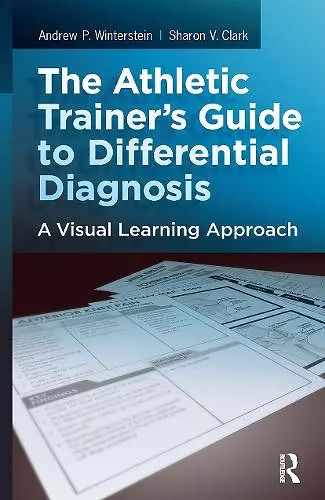The Athletic Trainer's Guide to Differential Diagnosis
A Visual Learning Approach
Sharon Clark author Andrew P Winterstein author
Format:Paperback
Publisher:Taylor & Francis Inc
Published:15th Sep '14
Currently unavailable, and unfortunately no date known when it will be back

As educators, we strive to teach students to think critically and to commit to a diagnosis, the ability to make that commitment is one of the most difficult steps for clinicians in training. With many possible injuries and conditions, and an equally large number of diagnostic elements, a clear and logical method is needed.
The Athletic Trainer’s Guide to Differential Diagnosis: A Visual Learning Approach provides an approach that helps the reader sort through the possibilities and think about the clinical evaluation within a clinical thinking framework using a visual mapping approach.
The Athletic Trainer’s Guide to Differential Diagnosis is not designed to be a “how-to” evaluation text. Rather, it is designed to create a framework that allows the reader to think differently about differential diagnoses, access existing knowledge in anatomy and clinical evaluation, and assess information for the purpose of making higher-order clinical decisions.
Dr. Andrew P. Winterstein and Sharon V. Clark have organized The Athletic Trainer’s Guide to Differential Diagnosis by body part, as well as by location in the body. The reader will be able to examine the possible diagnoses by location and approach the evaluation in a more focused and organized fashion. This method of evaluation also allows the reader the opportunity to apply evidence-based principles to the clinical evaluation process.
The Athletic Trainer’s Guide to Differential Diagnosis takes a visual learning approach with an emphasis on diagrams, tables, and boxes to illustrate the visual evaluation framework. In addition, each chapter offers a clinical case to provide a springboard for approaching the differential diagnosis process.
The Athletic Trainer’s Guide to Differential Diagnosis: A Visual Learning Approach will enhance the athletic training student and clinician’s critical thinking skills, as well as be an excellent resource for self-assessment and preparation for certification.
“This book has a very unique perspective on athletic training, and fills a glaring void in the literature…This guide takes a very complex and daunting topic, simplifies the process, and makes the information much more accessible for students who are learning, as well as for practicing professionals who may need to refresh their memories or were never taught the process in the first place. The organization of the book makes it an easy reference for students and professionals alike, and the addition of the “diagnostic evidence” sections promotes the incorporation of evidence-based medicine into everyday practice.”
- Kimberly M. Friedman, MS, ATC, CES, Hospital of the University of Pennsylvania, Doody's Review Service
“I am convinced The Athletic Trainer’s Guide to Differential Diagnosis is an essential text for athletic trainers entering the high school setting, who are often without colleagues to discuss interesting and difficult cases… Winterstein and Clark have distilled a tremendous amount of useful information into simple groupings of boxes and lists. This is a unique and effective approach to learning the construction of differential diagnosis. The large number of lists contained in the text makes this book a useful addition for practitioners. I have already asked our library to order a copy because I want to keep a copy in my own bookcase.”
- James M. Lynch, MD, Florida Southern College, The NATA News
ISBN: 9781617110535
Dimensions: unknown
Weight: 712g
370 pages